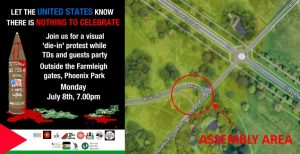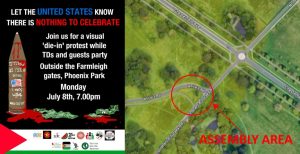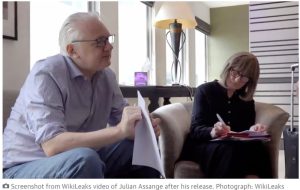Shannon Airport
Michael D speaking on the Adjournment of the Dáil
Thursday, 29 November 2007
Deputy Michael D. Higgins: I thank the Ceann Comhairle for affording me the opportunity of raising this urgent matter. It had been our understanding that with the change of Government would come an interest in implementing the capacity of the Government, through, for example, the civil aviation Acts of 1978 or 1987, to achieve inspections of planes that had a record of participation in extraordinary rendition.
I raise this because of some recent events in Shannon Airport. A complaint was made to the Garda Síochána by Mr. Edward Horgan and that statement, which was recorded on 30 October 2007, has drawn the following reply of 1 November:
Dear Mr. Horgan,
I refer to the Statement you made at Shannon Garda Station on October 30th, 2007 to Garda Edward Henderson.
Shannon Airport
Michael D speaking on the Adjournment of the Dáil
Thursday, 29 November 2007
Deputy Michael D. Higgins: I thank the Ceann Comhairle for affording me the opportunity of raising this urgent matter. It had been our understanding that with the change of Government would come an interest in implementing the capacity of the Government, through, for example, the civil aviation Acts of 1978 or 1987, to achieve inspections of planes that had a record of participation in extraordinary rendition.
I raise this because of some recent events in Shannon Airport. A complaint was made to the Garda Síochána by Mr. Edward Horgan and that statement, which was recorded on 30 October 2007, has drawn the following reply of 1 November:
Dear Mr. Horgan,
I refer to the Statement you made at Shannon Garda Station on October 30th, 2007 to Garda Edward Henderson.
I wish to inform you that the Gardai will not be taking any action on the information contained in your Statement.
Mr. Horgan was referring to the arrival in Shannon of Gulfstream VI aircraft registration No. N475LC. This aircraft, along with another, has the highest record of participation in extraordinary rendition flights, as established without doubt by the European Parliament and by other European agencies. The other aircraft is No. N478GS. Between the two, they made 76 rendition flights. Anybody who has seen the conditions that prevail at Guantanamo Bay at present will know the consequences or end point of extraordinary and illegal rendition.
I do not have time to say more than this. I believe that the members of Government and ourselves are opposed to extraordinary rendition, as are the Irish public. However, the Irish Human Rights Commission and several other bodies are totally dissatisfied with the fact that while we have the capacity to search aircraft in the two pieces of legislation I mention, we resolutely refuse to do so. This is not to give sufficient compliance with the United Nations Convention Against Torture. Every legal opinion offered on the anti-torture convention suggests that compliance requires being able to say that you are certain that you have not participated, even indirectly.
This plane arrived in Shannon. In plenty of time Mr. Horgan approached Garda Pat Harte and Garda Fitzgerald. Here is the point. As the conversations developed Garda Fitzgerald said to Mr. Horgan that they had instructions from the Attorney General not to inspect such planes.
I place this statement on the record of the Dáil. It requires an answer. If such an instruction was given in this, or any, instance, it would be an outrageous breach of international law. It would be an incredible reflection on this country, apart altogether from the substance of what is going on.
I understood that when the Green Party, for example, was deciding to participate in the present Government, it had at least secured some form of commitment to inspection. I happen to have the greatest respect for the Minister of State, Deputy Carey, but this is such a flagrant departure from what is required in international law. This is a view that is not mine only. It is a view that is shared by Dr. Maurice Manning, the Irish Human Rights Commission and nearly every legal expert I know.
Is it a fact that gardaí have been an instruction not to inspect planes? Why are planes not being inspected? Why are planes with a demonstrated unequivocal record of participation in illegality able to put down in Shannon and take off again without being inspected, and all on the basis that we have been given a special assurance by a friendly nation?
It is not the action of a friendly nation to put another country into such a position that it is not able to say to the international community that we in full and clear compliance with the anti-torture convention. While we go on like this we are allowing our commitment to that convention, perhaps the most important in international law, to be called into question.
Minister of State at the Department of Community, Rural and Gaeltacht Affairs (Deputy Pat Carey): On behalf of the Minister for Justice, Equality and Law Reform, Deputy Brian Lenihan, I thank Deputy Higgins for raising this matter.
At the outset, let me state unequivocally that the Government is completely opposed to the practice of so-called extraordinary rendition, and our concerns in this regard have been made clear at the highest level of the US Government over an extended period of time. In response, the United States has provided categorical, unqualified assurances that Irish airports or territory have not been used for this purpose. These assurances have been specific, unambiguous and not circumscribed by any "technical legalities".
In the current programme for government, the Government has already committed itself to prioritising enforcement of relevant legislation, including the Criminal Justice (United Nations Convention against Torture) Act 2000. In particular, Garda investigation and enforcement efforts are being supported principally by making all necessary resources available for specialised training in the provisions of relevant statutes. The Minister, Deputy Lenihan’s, Department has engaged with the Garda authorities in this regard. The goal is, of course, to ensure that the practice of extraordinary rendition does not occur in the State in any form.
Moreover, although not within the ambit of the Minister, Deputy Lenihan, the Government has also committed itself to seeking EU and international support to address deficiencies in elements of the regulation of civil aviation under the Chicago Convention. As Deputies may be aware, this 60-year-old Convention provides no requirement for the supply of information on passenger, crew or cargo if the flight is a transit flight.
Moving to the specific concerns of Deputy Higgins, the Minister, Deputy Lenihan, understands that a private aircraft with registration No. N475LC—–
Deputy Michael D. Higgins: On lease to the CIA.
Deputy Pat Carey: —–landed at Shannon Airport on 30 October last at 1.14 a.m. and departed at 2.03 a.m. It is understood that this aircraft is owned by a private company based in Las Vegas. The landing was for a technical/refuelling stop and, in accordance with the Chicago Convention, aircraft may come into Ireland for such technical stops without notifying any national authority.
The Minister, Deputy Lenihan, further understands that the presence of this aircraft at Shannon Airport was the subject of a contemporaneous complaint to the Garda Sfochana, with the complainant requesting an aircraft search. The Garda response to this complaint did not include an inspection of the aircraft in question.
Deputy Michael D. Higgins: Why?
Deputy Pat Carey: However, the Minister, Deputy Lenihan, wishes to strongly contest any claim or suggestion that this occurred because of an "instruction" that searches in general or searches of particular types or classes of aircraft should not occur. Let me emphatically and unambiguously state in this House that no such instruction has ever been given or would or could be given by any Irish authority. On behalf of Minister Lenihan, I cannot be any clearer or more unambiguous in this regard.
In considering when and where the Garda Síochána can conduct inspections of aircraft on Irish soil, members of the Garda Síochána are as much bound – rightly bound – by the rule of anyone as anyone else. The Garda uniform does not entitle the wearer to dispense with common, statute or international law, as and when they please.
The legal position in the matter of aircraft inspections is relatively straightforward. So-called "State aircraft" such as foreign military aircraft generally enjoy sovereign immunity from search by Irish officials. However, in the case of all other aircraft registered to another state, whether used by foreign officials or otherwise, such as the one mentioned by Deputy Higgins, powers of search are available to the Garda Síochána.
However, these powers can be deployed only where there are reasonable grounds for their utilisation, capable of withstanding scrutiny in a court of law. In much the same way that a Garda needs reasonable suspicion—–
Deputy Michael D. Higgins: The plane had an outrageous record.
Deputy Pat Carey: —–supported by hard evidence to conduct a search of a private dwelling, so too must gardaí have similar standards of suspicion before inspecting an aircraft.
The mere assertion of wrongdoing by a member of the general public is clearly and obviously insufficient in this regard.
Deputy Michael D. Higgins: We will never know.
Deputy Pat Carey: Moreover, that a particular aircraft is rumoured to have been associated with the CIA on, for example, certain Internet blogs does not constitute probable cause to ground an inspection.
Deputy Michael D. Higgins: It is on the European aircraft register of flights.
Deputy Pat Carey: The Minister for Justice, Equality and Law Reform has repeatedly stated that any person with credible information that Irish airports have been used for any alleged unlawful purpose should report his or her concerns to the Garda Síochána. It remains the case that, on this basis of such reporting or any other information on foot of which the Garda Síochána has reasonable cause to suspect that an offence is being committed, statutory powers of entry and arrest are available subject to international law.
To date, where complaints of alleged unlawful activity concerning the use of Irish airports have been made to the Garda Síochána, Garda investigations have ensued and, where appropriate, files have been submitted to the Director of Public Prosecutions. In all cases, no further action was found to be warranted, owing to a lack of any evidence of any unlawful activity.
Having regard to the foregoing, the Minister for Justice, Equality and Law Reform considers that all reasonable, appropriate and sufficient measures have been and are being taken to ensure that Irish airports are not being used for any unlawful activity.
Deputy Michael D. Higgins: Should we submit that to the Council of Europe?






